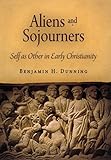Aliens and Sojourners : Self as Other in Early Christianity / Benjamin H. Dunning.
Material type: TextSeries: Divinations: Rereading Late Ancient ReligionPublisher: Philadelphia : University of Pennsylvania Press, [2012]Copyright date: ©2009Description: 1 online resource (192 p.)Content type:
TextSeries: Divinations: Rereading Late Ancient ReligionPublisher: Philadelphia : University of Pennsylvania Press, [2012]Copyright date: ©2009Description: 1 online resource (192 p.)Content type: - 9780812241563
- 9780812201819
- Alienation (Theology)
- Identification (Religion)
- Other (Philosophy)
- Self -- Religious aspects -- Christianity -- History of doctrines -- Early church, ca. 30-600
- Strangers -- Religious aspects -- Christianity -- History of doctrines -- Early church, ca. 30-600
- Theological anthropology -- Christianity -- History of doctrines -- Early church, ca. 30-600
- History-Ancient/Classical up to 500 CE
- Religion/Religious Studies
- RELIGION / Christianity / History
- Ancient Studies
- Religion
- Religious Studies
- 270.1
- online - DeGruyter
| Item type | Current library | Call number | URL | Status | Notes | Barcode | |
|---|---|---|---|---|---|---|---|
 eBook
eBook
|
Biblioteca "Angelicum" Pont. Univ. S.Tommaso d'Aquino Nuvola online | online - DeGruyter (Browse shelf(Opens below)) | Online access | Not for loan (Accesso limitato) | Accesso per gli utenti autorizzati / Access for authorized users | (dgr)9780812201819 |
Frontmatter -- Contents -- Introduction: Aliens, Christians, and the Rhetoric of Identity -- Chapter One: Citizens and Aliens -- Chapter Two :Going to Jesus “Outside the Camp”: Alien Identity in Hebrews -- Chapter Three: Outsiders by Virtue of Outdoing: The Epistle to Diognetus -- Chapter Four: Foreign Countries and Alien Assets in the Shepherd of Hermas -- Chapter Five: Strangers and Soteriology in the Apocryphon of James -- Conclusion -- Abbreviations -- Notes -- Bibliography -- Index -- Acknowledgments
restricted access online access with authorization star
http://purl.org/coar/access_right/c_16ec
Early Christians spoke about themselves as resident aliens, strangers, and sojourners, asserting that otherness is a fundamental part of being Christian. But why did they do so and to what ends? How did Christians' claims to foreign status situate them with respect to each other and to the larger Roman world as the new movement grew and struggled to make sense of its own boundaries?Aliens and Sojourners argues that the claim to alien status is not a transparent one. Instead, Benjamin Dunning contends, it shaped a rich, pervasive, variegated discourse of identity in early Christianity. Resident aliens and foreigners had long occupied a conflicted space of both repulsion and desire in ancient thinking. Dunning demonstrates how Christians and others in antiquity capitalized on this tension, refiguring the resident alien as being of a compelling doubleness, simultaneously marginal and potent. Early Christians, he argues, used this refiguration to render Christian identity legible, distinct, and even desirable among the vast range of social and religious identities and practices that proliferated in the ancient Mediterranean.Through close readings of ancient Christian texts such as Hebrews, 1 Peter, the Shepherd of Hermas, and the Epistle to Diognetus, Dunning examines the markedly different ways that Christians used the language of their own marginality, articulating a range of options for what it means to be Christian in relation to the Roman social order. His conclusions have implications not only for the study of late antiquity but also for understanding the rhetorics of religious alienation more broadly, both in the ancient world and today.
Mode of access: Internet via World Wide Web.
In English.
Description based on online resource; title from PDF title page (publisher's Web site, viewed 08. Aug 2023)


